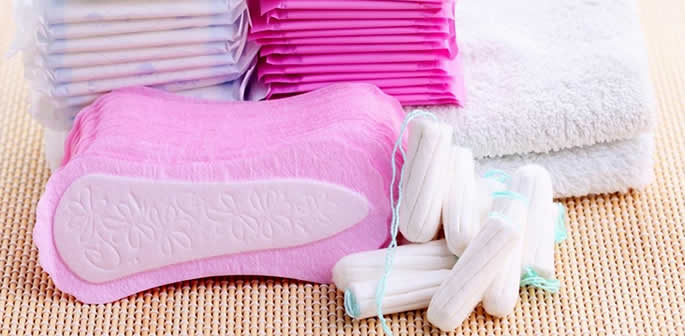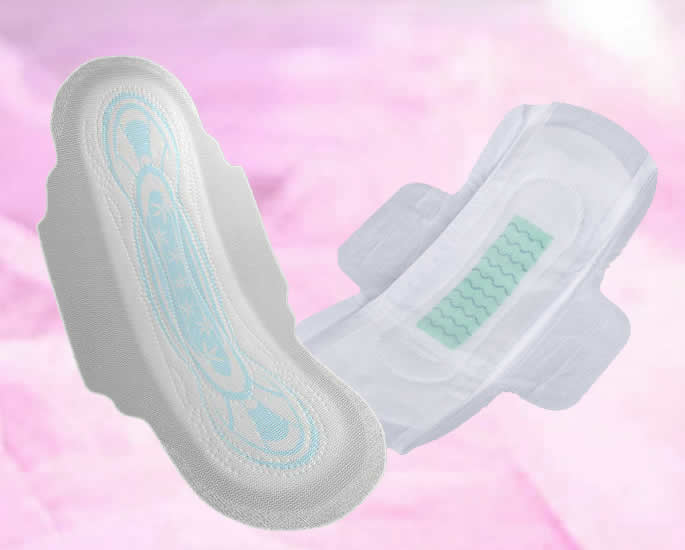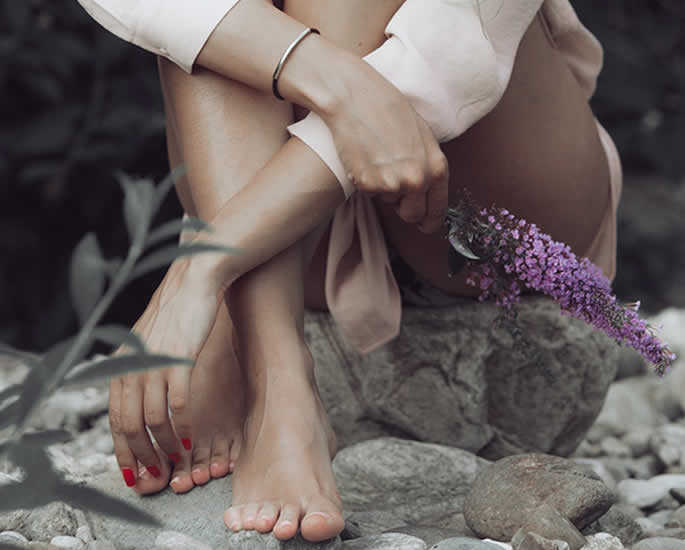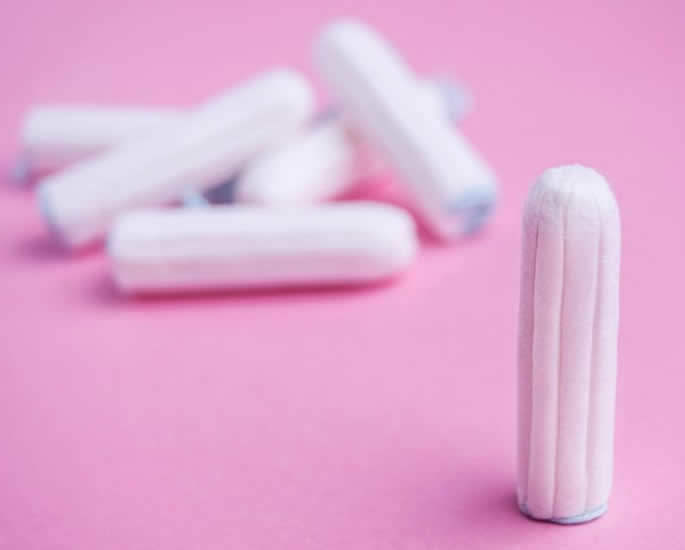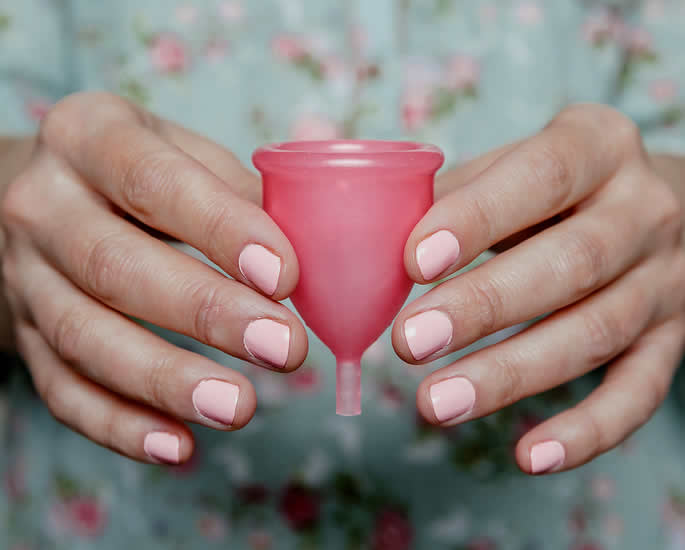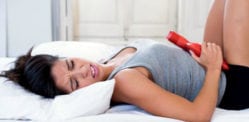"Honestly, anything but sanitary pads just feels like a faff."
So that ‘time of the month’ has hit and alongside the bloating, cramps, acne, you’ve got to deal with period products.
On the face of it, this should be straightforward. But when even the word ‘period’ is so difficult to say, there’s an evident lack of frank, honest conversations around menstruation.
Indeed, in research from Action Aid, 54 % of British girls and women are embarrassed about discussing periods.
Even when you switch on the television, adverts for menstrual products are far from reality. Showing smiling and chirpy women, the sale of products like menstrual pads depict blood as nothing more than a tiny pale blue dot.
Yet, the reality couldn’t be more different. Women deal with challenges ranging from heavy and painful periods to feeling the need to be discreet in male-dominated environments.
The ultimate aim when examining the range of period products available is to choose the best option for you.
Unfortunately, already in the British Asian community, talking about anything ‘down-there’ is difficult. As DESIblitz has previously uncovered, menstruation is still a taboo.
While we’ve considered the different range of products available, the best advice comes from real life. Therefore, we’re looking at real British Asian views on period products from British Asian women.
Sanitary Towels: First Doesn’t Equal Best
Sanitary towels are one of the more commonplace choices of period products. Widely available, they are often given to girls when they start their periods as they are straightforward to use.
Nonetheless, just because they are the first option, this doesn’t mean they are necessarily the best period product.
Resha, a 32-year-old beauty consultant comments that:
“I first got my period at school and so got a wingless pad to deal with. My mum died when I was little and my dad has always tried to do his best.”
“But he obviously didn’t know much and of course, my younger brother didn’t. I just carried on using the same type of pads as I didn’t think to do anything else. Obviously, school talks about the biology of periods but nothing else.”
She reveals:
“In my twenties, I did try other period products like tampons. But honestly, I’ve been most comfortable with pads.”
“The only thing is, as no one talks about it, I hadn’t realised the range out there. I prefer wings as they feel a lot more secure. Then my period lasts for a while but is quite light – some months I can just wear a panty liner.”
Meera, a 19-year-old receptionist, has similar sentiments:
“I find sanitary towels the most convenient period product. I dress quite smartly so I don’t want to be mucking about with my tights and layers and worrying about a moon cup or tampon.”
“There’s always sanitary bins in the bathroom and it takes five seconds to discretely take a spare towel to the bathroom, change and be back in my seat.”
“Honestly, anything but sanitary pads just feels like a faff.”
On the other hand, she understands why some women might be put off, admitting:
“I’m quite independent in my job so no one would be going in my bag or monitoring me. Plus our building is air-conditioned so I don’t have to stress when it’s hot and my period is heavy.”
Indeed, the environment that you work or study in, is crucial to consider. It seems to affect women’s choices of a period product more than you would think.
Adapting to Your Environment
As menstruation starts in the teenage years, sanitary towels can be a straightforward choice of period product. Studies are spent mostly sitting down with regular breaks.
However, dealing with menstruation can become more complicated as you enter the working world.
Anushka, a 23-year-old Chemistry student tells us:
“I use pads mostly as during my studies, I’m conscious of making healthy choices for all of my body and it lets the area to self-clean.”
“I know it’s not that likely but I feel like I worry less with pads. In comparison to clock-watching if I wear a tampon.”
“But I really struggle with long days in labs as I have a really heavy period some months. If I’m popping to the loo to change, it’s really noticeable in a small team of mostly guys!”
She then clarifies:
“I’m very confident and outspoken and usually would banter back if a guy said something about me always going to the toilet. The problem is that we have a lot of international students or older supervisors who may not pick up on my tone…”
“Being in a professional environment, I’d rather not have an issue with miscommunication and upset anyone.”
A retail worker, Beejal, has the same frustration and explains:
“Peak season in retail work can be really difficult. We’re allowed to go to the toilet of course, but there’s a minimum number of people that have to be on the shop floor.”
“When we’re on minimal staff or it’s the Christmas rush, you’re working long hours and barely get a second to yourself.”
“You can’t be rushing to the toilet and I usually get caught by a customer on the way. It’s just easier for me to stick to pads and not worry about leakage like with tampons.”
These are situations that you’d never stop to think of, yet so many British Asian women are probably dealing with the same issue.
In fact, Beejal reveals that:
“My aunt worked in retail too, but she’s older than my parents and probably would never think to talk to me about that sort of thing.”
Health Concerns of Tampons
Tampons are another popular period product and alternative to sanitary pads.
The health issues of using tampons have already been mentioned like Toxic Shock Syndrome, a complication of a bacterial infection.
Cases are rare, especially with the proper use of tampons. Yet there’s still a lot of fear around the use of them.
28-year-old Siddiqah remembers her first chat with her mum about periods:
“We’ve always had a good relationship and I can talk to my mum quite easily about things. But she can be a bit stubborn about her opinions.”
“She was convinced that if I ever used tampons, I would immediately get Toxic Shock Syndrome. That isn’t the case and I’ve used them since and told her. After that and a bit of research, she’s a bit more relaxed about it – she still isn’t too keen though.
Medical student, Surinder respects these concerns about tampons:
“There’s sometimes a divide between what you know and what you feel comfortable with. I know the statistics and it can be an uncomfortable reminder, reading about it so much.”
“I’m interested in women’s sexual health so I keep up to date. Although I use tampons, I’m very careful.”
However, with every problem, comes the need for a solution and Surinder gives us some hope for change:
“From hating them so much, one positive thing is that I really want to improve options for women. They’re not very environmentally friendly and actually not very cheap!”
“There’s got to be a better alternative and something that’s cheaper for women of all backgrounds to buy like homeless women.”
Practicalities like these are a key concern for women including British Asian women. Equal access to good period products shouldn’t be so difficult.
Yet, alongside the cost, menstruation can provoke a number of practical issues.
Practical Choice
Tampons are a highly useful period product for the sporty British Asian girl. Since they restrict movement less than pads, they’re the go-to for girls like Diya.
“I’m so used to tampons that I can’t imagine anything else. I’m really active as a personal trainer and generally sporty. I need something that lets me move about and tampons definitely do that.”
Diya discusses her first experience of her period and tampons.
“I was about 13 when I started my period and had a swimming gala coming up. It felt a bit weird as I’d never used them before or even had friends who would talk about it.”
“My mum had no idea about them so I had to go to my cousin. Luckily, we’re super close so I could ask her to help me buy them and what to do.”
“I don’t know what I would have done otherwise but there was no way I was missing the gala!”
On the other hand, Shruti shares her frustration with the limited options for active women:
“I wish there were more options out there for women, especially less invasive ones than tampons or menstrual cups.”
“I stick to tampons as they’re the easiest practical option. But I’d be willing to pay more for a better period product that I could wear even if my period is really heavy or light.
Like Shruti, Karan would be willing to pay more for something suitable for sport:
“I currently use a tampon but I’m having to use a really thin panty-liner in case of leakage. If there were better options out there, I’d be so happy.”
Nonetheless, tampons raise more than health or practical concerns too. Culture can make simply the idea of using tampons difficult.
Cultural Concerns
British Asian communities seem to often influence female sexuality and sexual health. Taboos in the community can make everything from smear tests to sex toys unacceptable.
Amina, aged 20, tells us:
“I use pads because of my mum. She is always funny about the idea of tampons. Even though I know biologically that they don’t “stretch” you or break your hymen, her distaste for them put me off.”
“I can’t be bothered for the argument if she finds out.”
Maryam, aged 18 recounts a similar experience with her mother:
“Since my mum doesn’t like them and I don’t have older sisters, it’s tricky. All you have are some instructions on the back of the box and I have no one to ask. I have close girlfriends but I can’t imagine asking them for help!”
She continues:
“You want to hear people’s personal experiences and real-life advice. I worry about the horror stories or how far should they go up? Do they leak? What if your period is really heavy or light?”
“I don’t have anyone to ask and I wish I did. Having these conversations openly would be really helpful.”
These complaints are repeated by Nisha, a 26-year-old lawyer. but she has some additional grievances:
“My mum talked about my future husband not liking it. Somehow using a bunch of cotton means that I wouldn’t be a virgin anymore.”
“So basically I have to put up with years of being uncomfortable every month just for some future guy’s ego.”
Most surprising perhaps is Asma’s perspective:
“I didn’t even realise that I could use tampons if I was a virgin. Since I didn’t talk about period products with my friends or family, when my mum told me to wait after marriage, I just thought I couldn’t.”
“I started my period later than most girls and was always quite shy about things like that. Until I lived in a house of girls at university, I didn’t know much. They were so shocked until one of the other Asian girls piped up in my defence.”
“She said that her mum was really good about talking to her about things like that, but another Asian friend didn’t. Instead, it was up to her to help her friend.”
On a good note, Asma mentions that:
“I’ve ended up teaching my mum a lot of things. How was she meant to know if her mum never spoke to her about periods?”
“I think it’s up to the younger generation of British Asians to normalise these topics.”
This is a hopeful outlook for reducing the stigma around menstruation for British Asians. But with new period products becoming available, how much are South Asian women adopting them?
Moving to Menstrual Cups
Menstrual cups can seem like a trendy option in some circles due to their environmentally-friendly status.
They offer benefits like saving money in the long term, as they are reusable, and the aforementioned practical benefits.
Although even if British women use them, what do British Asian women think?
23-year-old, Zara is immediately enthusiastic:
“I love, love, love my Mooncup! Honestly, it’s changed my life. I find it so much more comfortable and I hated always having to remember to buy tampons or sanitary towels.”
As a more recent adoptee, Nisha has been experimenting using one and provides her current review:
“I’m still getting used to mine but I’m quite environmentally-conscious so I’m giving it a go.”
“I used to wear tampons during the day and pads at night so it felt quite wasteful. Whereas I’m happy with the money I’m saving and that I don’t have to think about it.”
30-year-old creative, Anjali, adds laughingly:
“I have a menstrual cup, which I like, but I can be bad at using it. I’m always running late in the mornings but they’re hard to insert properly when you’re rushing to beat the traffic. I don’t have time to fiddle around with them.”
“Though even if you’re like me, they’re worth their money as they’re reusable. They’re a great option for when you’re at home all day.”
In fact, they do seem to be a great option for long-term use in somewhere you feel comfortable as Kavita comments:
“Honestly mine is so perfect when I’m at home or can plan my day around when I’ll be home from work.”
“The only problem is when travelling as I haven’t dared to try to use mine over a long-term trip. I wouldn’t be confident in finding somewhere to keep it clean and storing it.”
A Final Say
The opinions of real British Asian women demonstrate that when choosing period products, there isn’t a ‘one size fits all’ choice.
Instead, the women highlight how important it is to adapt your use of period products to your life.
Rather than accept the first option due to cultural pressures or lack of knowledge, make an informed decision.
From considering the environment you’re living or working into factors like how much you’ll be moving, the suitability of a period product changes depending on your situation.
Finally, as innovations hopefully continue for the range of period products available for women, don’t be afraid to give something new a go and have conversations about your options.
After all, when menstruation is a monthly part of life, it shouldn’t be a taboo to talk about the topic. Like these women, an open and honest dialogue could help someone else.




















































